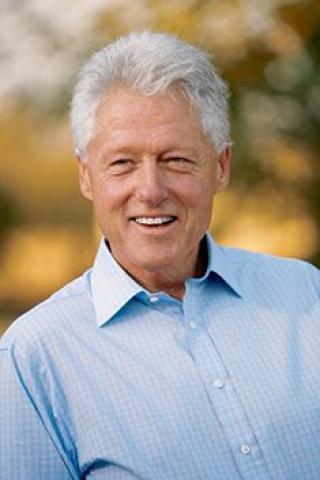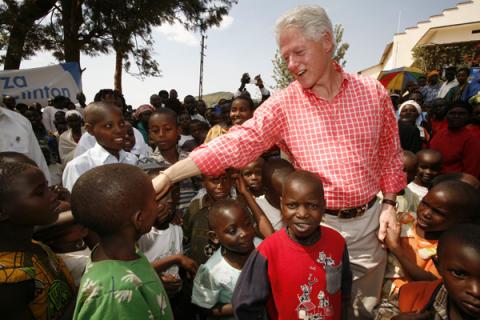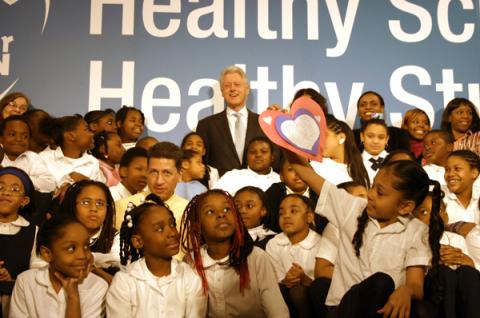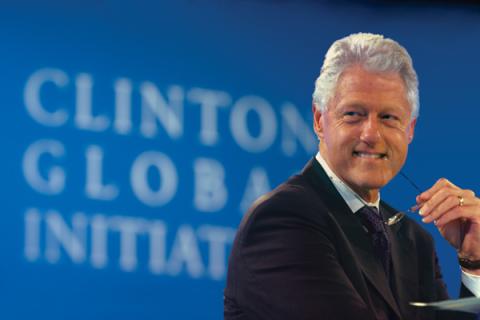
During a speaking engagement at Toronto’s BMO Field late summer, the 42nd President of the United States not only outlined what his Foundation is doing and the problems it is facing, but how we as individuals can make a difference as well.
Samaritanmag.com’s Cori Ferguson was there to capture his thoughts.
CLIMATE CHANGE:
“The world that we live in is unsustainable because global warming is real. You may get a few years advantage out of a northwest passage when the ice around the North Pole falls, but if, in the end, we keep warming the planet the way we are, it’s going to upset agricultural patterns and it’s going to change the balance of life on earth in ways that will be absolutely calamitous. You can ask our friends in Australia. That’s the place that is most clearly experiencing the adverse impact of climate change. So that means that all of us that are not in a political position have to ask ourselves, number one, who do I want to vote for? It really matters who’s in government. For example, I’ve got a great climate change project, but I can’t give you a new agreement. Number two, you have to say, whatever business I’m in is there any way I can do it that it still makes money, that produces an equality and stability in the unsustainability caused by climate change? And number three, we should all be doing something like what I do with my foundation. If you give $1 a year to a local community project, you’re doing that; you’re creating a civil society.”
RURAL URBAN DIVIDE:
“For the first time in all of history, more than half the world’s people live in urban areas. In this last decade, that occurred. The good news is that not withstanding urban poverty, which has been outlined in movies like Slumdog Millionaire, by and large people come to cities because there are more economic opportunities there. The bad news is that no one has figured out how to extend those economic opportunities fairly to all people who live in urban areas and even more importantly how to take the kinds of technological advantages that have been highlighted here for more than 120 years, and put them into rural areas in a way that permits sustained balance even economic opportunity. It’s one of the great challenges.”
“We have to find win-win, not win solutions. We have to say, for all of our differences, our common humanity matters more. And dealing with this rural urban divide is a big part of it. Let’s take an extreme example. Afghanistan, where Canadian have lost soldiers fighting the terrorists and where you see the Taliban making gains again in rural areas and they’re providing 90 percent of the world’s opium, or Columbia, which used to have a third of its land controlled by narco traffickers and they rolled back a lot of that but it’s still a big problem, why is that? ‘cause these farmers can’t make a living doing anything else that remotely approximates what they’re being paid for growing these drugs. In Haiti, where Canada and the United States have a huge interest because we have a big Haitian Diaspora, we’re working hard to help the best government they’ve had in 35 years and finally slip the bonds of their history. Why is deforestation such a big problem? ‘cause people have to have something to burn to make dinner at night and charcoal is cheaper and more available and put more people to work than any other alternative. One of the things that I’m doing down there, working with the UN, is finding a way to use solid waste to create fuel that will put 10 or 20 times more people to work and encourage people to make money leaving the trees up, instead of cutting them down. These are the kind of things that we all have to be thinking about as we chart our course into the future.”

AIDS AND HEALTH NETWORKS:
“When my foundation started working on the AIDS problem, originally the drugs were too expensive and too inaccessible. Well, now we sell that medicine in 70 countries; two million people buy off our contracts. That’s half of all the people in poor countries in the world getting medicine, two-thirds of all the children getting paediatric medicine. No body’s gonna die this year in those countries because the medicine’s not available or it’s too expensive. By and large, they’re gonna die because they live in rural areas without any health systems, without health networks.”
“We work in Ethiopia. We have 160 employees. In Ethiopia, a country of 80 million people, 60 percent of them still live in towns of a thousand or less. There are a minimum of 48,000 villages there. Actually, there are more ‘cause a lot of them are 500 or fewer. In all the big cities, the health networks are good. In the 48,000 villages, there are – or were when we started 2 years ago – only 700 clinics. We know we don’t need to have one in every [village], but we are out there trying to figure out how to build 3500 more clinics so that everybody will be within a day’s walk of being tested for AIDS and any other disease, of getting basic maternal health, of being tested to see if the medicine works. It’s not very much, but it makes all the difference between whether you have any chance in a rural area, if, god forbid, you’re born with HIV because your parents had it or you have it from contaminated blood. It is an example of the problem that exists throughout the developing world.”

“Some of problems that I share with all foundations, after the markets collapsed on September 15, I lost about 17 million dollars in pledge commitments because I had a lot of supporters that lost 70 percent of their net worth in a month or two. And so I had to go back and change that whole giving structure of my foundation to get a larger number of small contributions. Before that, I had 200,000 contributors at $150 or less and most of the others were $200,000 or more. That’s not a sustainable model. But I had the fastest growing foundation in the world in 2007, according to The Chronicle of Philanthropy. So I spent the last six months going back trying to get more people to get me $100, $150, increase our internet donations, and to get more modest sized donations at just above that amount. So I’ve done that.”
“The other big problem we have is you can’t help people that aren’t willing to do their part. And so a big constraint on me is that I won’t go into a country if its government doesn’t ask me. Then if they ask, I won’t implement a health care plan or an energy plan that’s mine — it has to be theirs. We’ll help them if they ask to develop a plan, but they have to embrace it. It’s their plan, not mine. And then I have a strict no corruption policy. Anybody starts raking off money, we’re outta there. It’s a cold blooded thing. It’s not as easy as it seems because what happens if I leave and nobody comes in with the AIDS medicine or what if I leave and nobody comes in with the energy project? But I am convinced that if you want a sustainable healthcare system, it has to be based on minimum standards of competence and honesty and we have to build it.”

UNITAID:
“The French, a few years ago, did a brilliant thing. They put a fee on airline tickets of about a euro, I think, on all the international tickets outside of France. If you go on any airline in France and you flew to another country, you pay a modest fee. They put this into a fund, sanctioned by the United Nations called the Unitaid and they got two dozen other countries to give them a little money and they use that money to buy medicine for poor people all over the world that they otherwise couldn’t buy. So they contracted with me to buy medicine for young children for AIDS, paediatric AIDS medicine. We cut the price from $190/year to $60 a year because we got the volume up and now we buy medicine for two-thirds of all the kids in the world. Because they found a way for huge numbers of people to contribute little bit.”
“I just came from San Diego from a meeting with people in the business travel business, people that do big bookings, and we’re going to try and do the same thing on a completely voluntary basis, in the U.S. and four or five other countries next year, where we just give people a chance to give one or two dollars on a ticket. If they do it, they know it will go into this fund and anybody that can get on an airplane can help to eradicate problems from AIDS to tuberculosis to diseases from dirty water, like cholera and dysentery, all over the world by getting basic medicine out there. For 50-cents you can put a clean water pack together that will give a family of four clean water for three days. So if we all just did a little bit but we could get huge numbers involved how much better that would be. I’m very grateful to the multi-millionaires and the handful of billionaires that have given me millions of dollars to save the lives of people that will never know that they did it, but it’s not a sustainable model. A sustainable model would be if every one of us had a little piece of the action even if it was a dollar a month, even if it was a dollar a year.”
THE ONE DECISION:
“The one decision we can make that will make the biggest difference in the world would also make quite big difference in America. It’s to radically change the way we produce and consume energy. If we made a decision that we’re going to move as close to energy independence as possible, and that we were going to reduce our green house gas emissions to save the planet for our children and grandchildren, and prove to the world it can be done in a way that was good economics, and promoted a more balanced economic growth, then a lot of things would happen. You’d see a lot of technology sharing back and forth across the border, between the U.S. and Canada, probably more relations between the U.S. and Mexico. Our neighbours and friends in Mexico could make a living in a whole lot of different ways and organize themselves to better resist the narco-traffickers there, the anti-trade tensions that are building up not just in America but all over the world. If you have a lot more new jobs you’d have wages rising again. The countries that have grown the most in the last decade, except for those like Canada that have a lot of natural resources, are the countries that are gonna beat their Kyoto protocol targets, the countries that have become most clean energy-oriented, most energy efficient. They’ve opened all kinds of new job opportunities, new business opportunities. So I think if we did that and we cooperated with China, we cooperated with India, we worked with the Europeans, the Japanese, and we built, here in North America, a kind of powerhouse of clean efficient energy that was focused on maximising job creation, it would change the world. I think it would change the future. And I think it would have the single biggest impact of any single thing that we could do.”